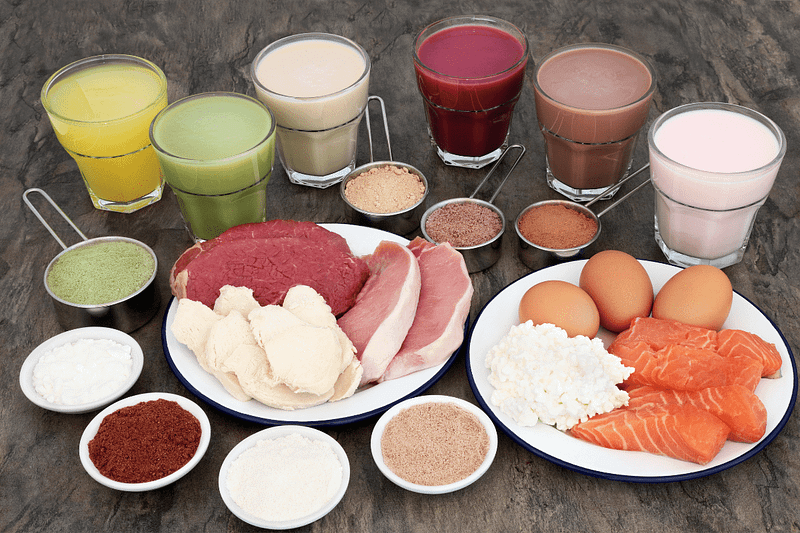Understanding Protein Intake for Effective Weight Loss
Written on
Chapter 1: The Protein Paradox
Are you aiming to shed fat while building muscle? Or perhaps you wish to maintain a lean and healthy physique? The conventional wisdom suggests significantly cutting down on carbohydrates while boosting protein consumption.
This notion has become a mantra in today’s health and wellness landscape. The industry seems ready to cater to your desires with a plethora of options:
Protein shakes, whey protein, casein, egg whites, plant-based alternatives, protein snacks, vegan protein bars, collagen peptides, hemp protein, L-carnitine, branched-chain amino acids (BCAAs)...
The options are endless.
NUTRITIONAL SCIENCE SUPPORTS HIGH PROTEIN INTAKE FOR WEIGHT LOSS
Extensive research indicates that choosing healthy protein sources is crucial for weight loss or preventing weight regain. A significant European study, the Diet, Obesity and Genes (Diogenes) study, demonstrated that individuals consuming higher protein diets experienced more noticeable weight loss and less weight regain over a year.
This compelling evidence has spurred numerous dietary plans promoting increased protein in meals. However, just like with any broad statement, we might overlook certain subtleties that could hinder our progress toward achieving and maintaining a healthy weight.
One common misconception is that loading up on protein automatically translates to increased muscle mass.
MORE PROTEIN DOES NOT EQUAL MORE MUSCLE
While it is true that a sufficient amount of essential amino acids is necessary for muscle growth—particularly leucine, which activates the mTOR pathway to start protein synthesis—the adage “more is better” does not apply in this context.
HOW MUCH PROTEIN DO YOU REALLY NEED?

According to scientific recommendations, here’s a general guideline for protein intake:
- Healthy adults: approximately 0.8 g/kg of body weight per day to maintain balance and support metabolism.
- Pregnant women: about 1 g/kg BW/day.
- Breastfeeding women: roughly 1.2 g/kg BW/day.
- Elderly individuals: around 1 g/kg BW/day to combat muscle loss (sarcopenia).
- Athletes engaged in intense exercise: 1.4 - 1.8 g/kg BW/day.
- The Diogenes study even suggested that obese individuals aiming to lose weight might benefit from as much as 1.3 g/kg BW/day over the course of a year.
These figures serve as general guidelines. Individual needs can vary based on age, lifestyle, stress levels, chronic health issues, physical activity, gut health, and hormonal balance.
CAVEATS: Bodybuilders operate under different standards that are not covered here.
WHAT HAPPENS IF I CONSUME EXCESS PROTEIN?
You might wonder: “What’s the harm in consuming more protein?” To understand this, consider two important points:
- The body lacks a "protein storage" system—muscles serve as structures, not storage depots.
- In contrast, fat is stored in adipose tissue, while carbohydrates are stored as glycogen, primarily in the liver and muscles.
This distinction is crucial. After each meal, the body utilizes the amino acids it needs for:
- Building structural proteins (bones, muscles, hair, nails),
- Producing protein-based hormones (like insulin),
- Creating neuropeptides and neurotransmitters (such as glutamate, serotonin, dopamine),
- Synthesizing enzymes,
- Forming antibodies,
- Replacing protein lost through digestion.
Once these needs are met, any surplus amino acids from your protein consumption will be converted into:
- Sugar (increasing glycogen stores), and
- Fat (increasing adipose tissue).
Yes, you read that correctly: “Excessive protein can lead to fat gain,” which is counterproductive to your weight loss goals.
Additionally, excess protein can put significant stress on the kidneys.
KEY TAKEAWAYS
- Adequate protein intake supports healthy, sustainable weight loss and helps maintain a lean physique.
- There are many intricacies involved in dietary protein and maintaining a lean body.
- Your individual bio-needs will ultimately determine the type and amount of protein best suited to you.
- There is a limit to daily protein intake concerning effective weight loss and overall health.
© Teresa Morillas
Don't miss out on my upcoming articles! Subscribe here for insights on Nutrition, Hormonal Health, and Emotional Well-being.
Chapter 2: Common Protein Mistakes
In this video titled "You're Eating Protein WRONG! 5 Mistakes To Avoid," learn about the common pitfalls people encounter when adjusting their protein intake for weight loss.
The second video, "You're Doing Protein WRONG! (5 Mistakes)," provides further insights on the frequent errors individuals make regarding their protein consumption.